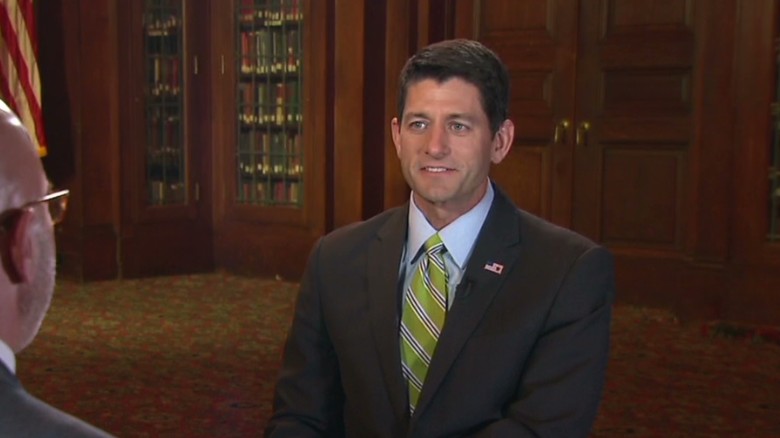The era of Paul Ryan has begun on Capitol Hill after House Republicans nominated the 45-year-old Wisconsin congressman to serve as speaker of the House, setting him up to be the youngest to ascend to the post since before the Civil War.
Ryan will step into a job he repeatedly insisted he didn’t want after easily defeating Florida Republican Daniel Webster for the top House leadership post, which is second in line to the succeed the President. The secret-ballot vote was 200 for Ryan versus 43 for Webster.
The full House of Representatives is now set to officially approve the nomination Thursday morning when the gavel will pass from Speaker John Boehner to Ryan.
The change in leadership comes after weeks of dramatic and public turmoil among House Republicans, after Boehner, who turns 66 next month, abruptly announced in late September that he was stepping down. Since Republicans took control of the chamber in 2011 and elected Boehner to the top post he faced a constant barrage of criticism from conservatives. A band of members on the right thwarted almost every major legislative move Boehner made, taking the county to the brink of default in 2011 and triggering a government shutdown in 2013.
Ryan pledged to unify the House Republicans and get the House back on track. “We have an obligation here in the people’s house to do the people’s business,” Ryan told reporters after the vote. “We are going to respect the people by representing the people.”
Ryan reluctantly agreed to seek the job after spending a week at home with his family in Janesville, Wisconsin, but agreed to run only if the various factions inside the House GOP backed him and signed off on his desire to protect his family time with his wife and three young children.
Already, Republicans were signaling that Ryan’s background as a policy wonk with experience on the national stage after as Mitt Romney’s 2012 vice presidential nominee would make him different from Boehner.
“Ryan is a really a thought leader for the Republican Party. We’ve been operating under his blueprints and he’s one of the best communicators that we’ve had — equal or even greater to Newt Gingrich,” California GOP Rep. Devin Nunes, a close ally of Boehner’s, said on Tuesday.
With the 2016 presidential race showcasing the split between establishment candidate and outsiders pledging to shake up the GOP, Ryan effectively becomes the national face of the Republican Party.
“It’s our onus, it’s our burden to set the agenda now because we don’t have anyone on the presidential side,” said Rep. Dennis Ross, R-Florida.
Will face challenge from the right
Inside the closed meeting Wednesday, Ryan was nominated by South Carolina Rep. Trey Gowdy, a close friend and a conservative beloved by the GOP base as the chair of the high profile Select Committee on Benghazi. Gowdy’s endorsement was seen as an important marker that the right flank, which had stymied Boehner, was prepared to give Ryan a chance to govern.
But Ryan is likely to confront the same criticism from the same outside groups that Boehner faced — that he’s not conservative enough.
He won 200 votes from his fellow Republicans, but will need 218 votes to win on the House floor. Webster gathererd 43 votes, a signal from the right wing that they will not give Ryan free reign. Rep. Tim Huelskamp, R-Kansas, a member of the power conservative House Freedom Caucus, said he voted for Webster but believes Ryan will get the 218 he needs Thursday.
A Ryan backer, Greg Walden, said the “political flu bug is over” and downplayed the tally, predicting Ryan would get in the range of 230 votes tomorrow.
Ryan did not initially want the job. When conservatives rejected Boehner’s number two, House Majority Leader Kevin McCarthy of California, to take his place, Ryan immediately put out a press release saying he had no interest in the job as speaker. He took a pass at running for president in 2016, told all his colleagues he already has his dream job as Chairman of the Ways and Means committee, where he set the GOP agenda on trade, tax reform and other complicated policy issues.
Many House Republicans — scrambling to find a leader to avoid what promised to be a messy process to united a deeply fractured conference — wouldn’t take no for an answer and made a full court press for Ryan to reconsider. Boehner and other top national Republican leaders, including Romney, to step in and save the party from an embarrassing spectacle.
“We’re in a new era of politics,” Nunes said, explaining that with growing media contingent covering every Washington debate and outside advocacy groups raising money off of Republican battles, it’s important to drive a direct message about the agenda the House is pursuing. “This is all about marketing.”
Changes sought to House process
Multiple House GOP members told CNN that Ryan’s success will be determined less by his personality than by how he follows through on his pledge to make the House use a more bottom-up approach to governing. Rank-and-file members are demanding they be given the chance to put their imprint on legislation before it reaches the House floor.
“In the business world where I came from, once a process was in place, the person wasn’t as important,” Rep. Jim Renacci, R-Ohio, told CNN. “If I had one recommendation for a Speaker Ryan it would be – make sure the process gets in place very quickly so he can continue the policy side, and the process can then can continue to work.”
Ryan already has vowed to change how the chamber operates and work on adjusting internal GOP conference rules to allow broader representation on committees.
The presumptive speaker already faced his first major challenge this week when Boehner announced he cut a major budget deal with the White House and quickly moved it toward a House vote Wednesday. Ryan distanced himself from the agreement, making conservatives happy by declaring that, “the process stinks.”
But even though he criticized the process, Ryan announced hours before the vote on the House floor that he’d back the deal. And although it sets spending levels for the next two years, one of the new speaker’s first tests will be passing a spending bill in December that sets more detailed budgets for federal agencies and avoids a government shutdown.


